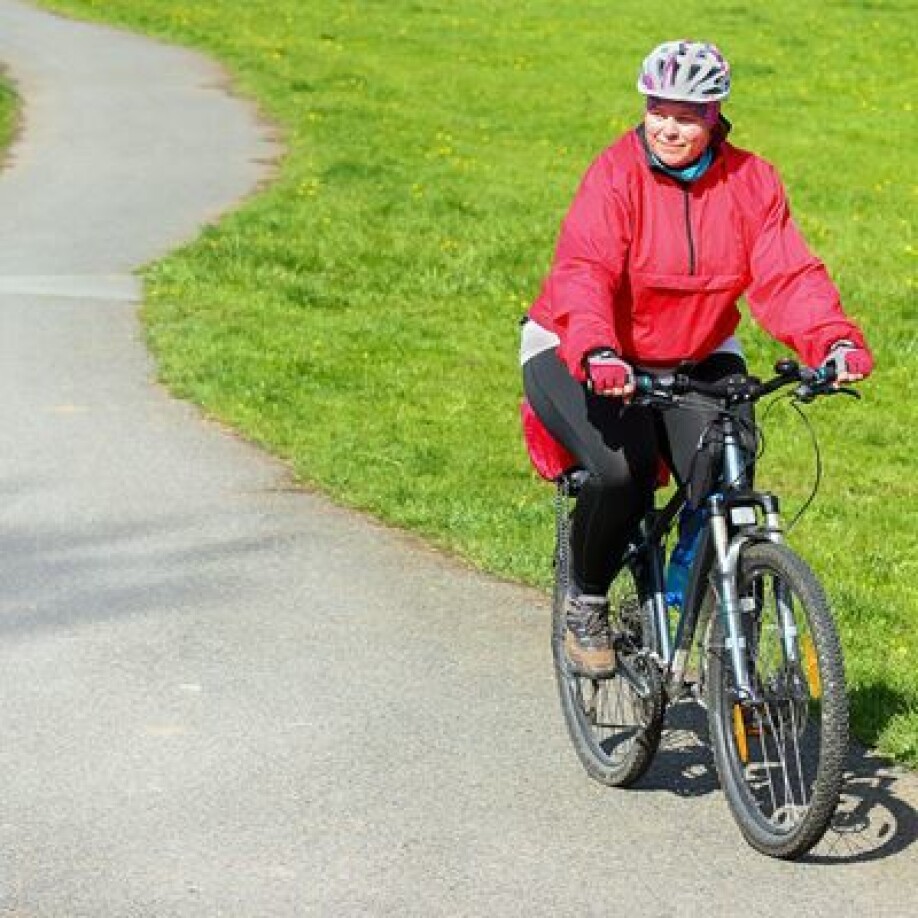This article was produced and financed by The Norwegian School of Sport Sciences - read more

Overweight? Keep active and live longer
Overweight people have a shorter life expectancy but can enjoy a much longer life by keeping active. And it doesn’t have to be that hard.
“This is great news for a lot of people who weigh more than they should or want to. Only a small amount of physical activity will substantially reduce the risk of getting ill and dying at a young age,” says Jakob Tarp.
He is a researcher at the Department of Sports Medicine at the Norwegian School of Sport Sciences (NIH).

Outweighing weight
Obesity and increased bodily weight involve much more than “looking good.”
The real problem is that people who are overweight run a much higher risk than others of suffering from serious illnesses such as diabetes type 2, cardiovascular disease and certain types of cancer – leading, in short, to a much shorter life expectancy.
“By keeping physically active, you can practically outweigh all these disadvantages and almost eliminate the increased risk of illness", says Tarp.
Avoid the lower 5th
Tarp is one of the authors behind a recently published article on physical activity, weight and mortality.
The study was conducted in the UK comparing statistics from 300,000 persons who were divided into groups based on level of physical activity and body mass index (BMI). The researchers then assessed the groups with different combinations of the above factors with a view to the risk of dying at an early age – compared with the group made up of persons 'with normal weight and level of activity'.
“We conclude that it is important to avoid being in the ‘20 percent’ group with the lowest level of activity. If you are able, literally, to walk your way out of that group, you can substantially improve your chances of a longer life, almost irrespective of your BMI,” says Tarp.
Other studies have shown that the risk of illness also decreases significantly with physical activity.
It is only when you have a very high BMI – above 35 – that physical activity cannot outweigh the increased risk.
Short walks
And we are not talking about heavy workouts.
“All that is required, for example, is to go for short walks or cycle to and from work. The important factor is to increase your pulse and breathing at least slightly, and most of us can do that", says Tarp.
An NIH-study published last year showed that a very low level of physical activity is, in itself, beneficial. You can read more about this here: Even a completely non-challenging stroll can significantly reduce your risk of premature death
The new study demonstrates that activity outweighs the increased risk of death due to being overweight or obese.
This is very important: Figures from the Norwegian Institute of Public Health show that as many as every fifth Norwegian has a BMI of more than 30, which is the borderline for obesity.
The same data show that less than 50 per cent of all Norwegians have “normal weight” (BMI of 18.5-25) and are therefore in the category with the lowest health risk.

Immediate effect
Former studies have confirmed how physical activity can both reduce the levels of dangerous cholesterol and fat in the blood, improve blood sugar regulation and lower blood pressure. Obesity has a negative impact on all these factors and represents a higher risk of diabetes type 2, cardiovascular disease, breast cancer and colon cancer.
Persons who suffer from any of the above will have a much more difficult life but will also represent major personal and economic costs for both their families and society in general. In addition, they have a much shorter life expectancy.
“The good news is that physical activity has an immediate effect. As soon as you get started, and every time you go for a walk, all these levels will improve,” says Tarp.
This is well documented.
Everything helps

It is difficult to accurately estimate how much activity is required to ensure a longer life for each individual, and by how much you can extend your life expectancy with a certain level of activity, but:
Around 150 minutes of “moderate to intense” activity every week has proved beneficial. This corresponds with the long-standing recommendations from the Norwegian health authorities.
“However, it is important to keep active on a regular basis", says Tarp.
"It's all about developing good habits and keeping active. But keeping active doesn’t have to imply ‘working out’. All kinds of physical activity is good, and if you’re not able to achieve 150 minutes per week, then it's OK to start with less.”
Moving away from obesity
Jakob Tarp explains that this also implies reconsidering the unilateral focus on “treating obesity” with weight loss.
“A lot of people struggle to lose weight. Our study shows that body weight is most probably less important if the person is able to start regular physical activity,” says Tarp.
The study also shows, however, that persons with normal weight and who were also physically active had the lowest risk of dying at an early age.
Reference:
Miguel A. Sanchez-Lastra et.al.: Physical Activity and Mortality Across Levels of AdiposityA Prospective Cohort Study From the UK Biobank, Mayo Clinic Proceedings, 2020.


































